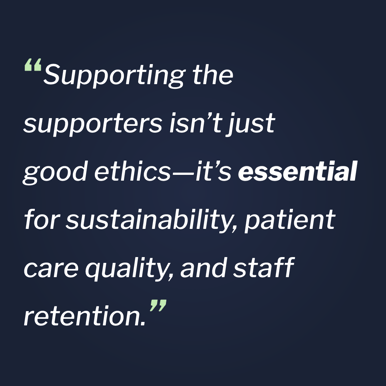Healthcare leaders face an unprecedented challenge: maintaining the mental well-being of frontline staff who regularly encounter high-stress situations, including the threat of workplace violence. As Mental Health Awareness Month reminds us, supporting the supporters isn't just good ethics—it's essential for organizational sustainability, patient care quality, and staff retention.
The Leadership Imperative
Healthcare executives and managers occupy a uniquely influential position in determining whether frontline staff thrive or merely survive psychologically. Leaders set the tone, establish priorities, allocate resources, and create the organizational culture that either supports or undermines mental health. This responsibility has never been more critical than in today's healthcare environment, where staff face complex stressors including workplace violence, staffing shortages, and high patient acuity.
Building a Comprehensive Support System
Effective mental health support for frontline healthcare workers requires a systems approach that addresses prevention, intervention, and recovery. Here's how leadership can implement such a system:
1. Create Structured Peer Support Programs
Peer support offers a powerful resource for frontline staff facing stressful encounters. Leaders can facilitate this by:
- Establishing formal peer support teams trained in psychological first aid and active listening
- Implementing check-in protocols following high-stress incidents
- Allocating protected time for peer support activities
- Recognizing peer support as valuable work rather than an optional add-on
Peer support is particularly effective because it comes from colleagues who truly understand the challenges of frontline healthcare work. It normalizes emotional responses to difficult situations and provides immediate validation when it's most needed.
2. Develop Conflict Coaching Systems
Conflict coaching provides individualized support for staff managing difficult interactions. Leadership can implement this by:
- Training designated coaches in conflict management principles and coaching techniques
- Creating clear access pathways for staff to request coaching
- Protecting time for both coaches and those receiving coaching
- Gathering feedback to continuously improve the coaching program
Conflict coaching bridges the gap between general training and specific application, helping staff apply principles like Vistelar's Treat With Dignity By Showing Respect to their unique workplace challenges.
3. Implement Structured Debriefing Practices
Effective debriefing following stressful incidents provides both operational learning and psychological processing. Leaders should:
- Develop standardized debriefing protocols that address both tactical and emotional aspects
- Train facilitators in trauma-informed debriefing techniques
- Ensure psychological safety during debriefing sessions
- Document lessons learned to prevent similar incidents
- Follow up with participants to assess ongoing support needs
When implemented consistently, structured debriefing helps prevent the accumulation of psychological distress by providing timely processing of difficult experiences.
4. Model Vulnerability and Self-Care
Leaders set powerful examples through their own behavior. By modeling appropriate vulnerability and self-care, they create permission for staff to prioritize their own mental health. This includes:
- Discussing their own emotional responses to challenging situations
- Demonstrating healthy boundaries around work hours and availability
- Using vacation time and encouraging others to do the same
- Speaking openly about seeking support when needed
- Participating in mental health initiatives rather than just endorsing them
When leaders practice what they preach regarding mental health, staff are much more likely to utilize available support resources.
5. Allocate Resources for Mental Health Support
Practical support requires tangible resources. Leaders should ensure:
- Budgetary allocation for mental health programs
- Staffing levels that allow time for support activities
- Physical spaces conducive to psychological recovery
- Technology support for virtual mental health resources
- Administrative assistance to manage support programs
Without adequate resources, even the best-intentioned mental health initiatives will fail to reach those who need them most.
Measuring Success
Effective mental health support systems require ongoing evaluation and refinement. Leaders should establish metrics to assess both implementation and outcomes:
- Utilization rates for support services
- Staff feedback on program effectiveness
- Retention data correlated with support program participation
- Absenteeism and presenteeism trends
- Incident reports related to workplace violence and staff distress
These metrics provide valuable insights for continuous improvement while demonstrating organizational commitment to frontline mental health.
The Return on Investment
While the moral case for supporting frontline mental health is compelling, the business case is equally strong. Organizations that effectively support staff mental health typically see:
Organizations that effectively support staff mental health typically see:
- Reduced turnover and associated replacement costs
- Lower absenteeism due to stress-related illness
- Improved patient satisfaction scores
- Enhanced recruitment appeal
- Decreased medical errors resulting from psychological distress
For most healthcare organizations, the return on investment for comprehensive mental health support exceeds 300%, making it one of the highest-return investments available.
The Path Forward
As Mental Health Awareness Month reminds us, supporting the supporters is both an ethical imperative and a strategic necessity. By implementing comprehensive support systems—including peer support, conflict coaching, and structured debriefing—healthcare leaders create environments where frontline staff can thrive even amid challenging circumstances.
The result is not just healthier staff but also better patient care, stronger organizational performance, and a more sustainable healthcare system for all.







